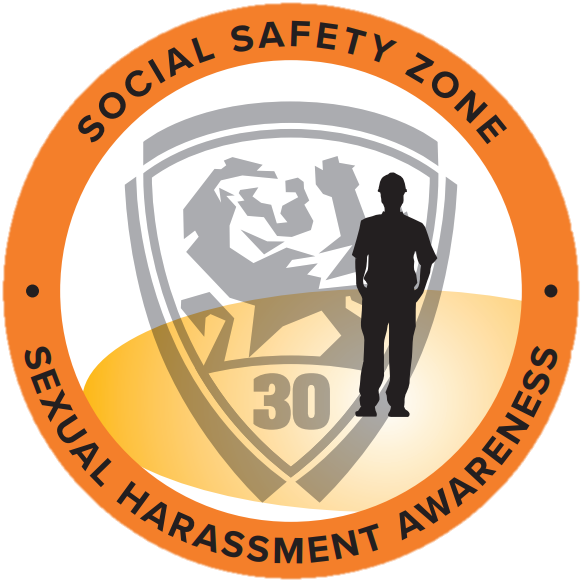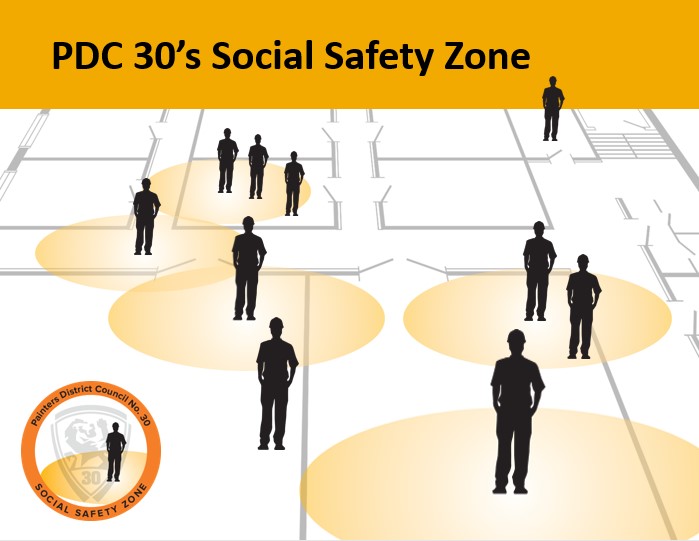Sexual Harassment Policy and Resources

Sexual harassment is prohibited by the PDC 30 Collective Bargaining Agreement, state and federal law, and local ordinances of most cities in which PDC 30 members and signatory employers perform work. PDC 30 is committed to helping members address behavior that may constitute sexual harassment and providing robust sexual harassment awareness training. This page contains important information about these goals and resources for members and employers.
Click here to view/download PDC 30's Policy on Sexual Harassment and Discrimination.
The PDC 30 Policy on Sexual Harassment
Painters District Council No. 30, the Finishing Contractors Association of Illinois, and all Employers signatory to the Collective Bargaining Agreement (jointly, “Parties”) prohibit discrimination and harassment of any kind, including sexual harassment, sexual discrimination, and sexual misconduct. The Parties are committed to ensuring safe, harassment-free workplaces for all workers. The Parties will operate a zero-tolerance policy committed to the principle of equal employment opportunity for all Employees and to providing Employees with a work environment free of sexual harassment, discrimination, and sexual misconduct. No Employee, regardless of the protected categories, should be subjected to unsolicited or unwelcome sexual overtures or conduct in the workplace. It is the responsibility of all supervisors to ensure that the work environment is free from sexual harassment. Further, this Policy represents a general conviction that an occurrence of sexual harassment, discrimination, and misconduct on a jobsite is equally as hazardous to our tradesworkers and our industry as a physical safety hazard regulated by OSHA due to distraction, stress, fear, and/or bodily harm.
Under the IL Human Rights Act, “sexual harassment” means any unwelcome sexual advances, requests for sexual favors, or any conduct of a sexual nature when:
- Submission to such conduct is made either explicitly or implicitly a term or condition of an individual’s employment,
- Submission to or rejection of such conduct by an individual is used as the basis for employment decisions affecting such individual, or
- Such conduct has the purpose or effect of substantially interfering with an individual’s work performance or creating an intimidating, hostile or offensive working environment.
Sexual Harassment Training Requirement (Illinois)
Effective January 1, 2020, pursuant to the IL HRA, 775 ILCS 5/2-109 (part of the Workplace Transparency Act), Illinois employers are required to provide ALL employees with sexual harassment training on an annual basis. The training must:
- Explain what sexual harassment is.
- Provide examples of unlawful conduct.
- Summarize relevant laws and available remedies under the law.
- Summarize the responsibilities of employers to prevent, investigate, and correct incidents of sexual harassment.
- Must be interactive and include participation by trainees (rather than a mere passive transmittal of information).
PDC 30 has developed a Sexual Harassment Awareness course to assist employers in adhering to the amended law. To register for an upcoming class, contact the NCIFTI (630.966.1451 or vperez@pdc30.com).
Know Your Rights: What to Do
If you experience, witness, or become aware of unwelcome sexual conduct, know that:
- You have the right to tell the person to stop. If they continue the behavior or retaliate against you because you asked them to stop, they can be found to have violated the law.
- You have the right to report the sexual harassment. Several reporting options are available. Persons who report sexual harassment or participate in investigations are protected from retaliation.
If you experience, witness, or become aware of unwelcome sexual conduct, if you feel safe to do so, taking these actions is helpful in addressing the behavior:
- Get out of immediate danger if necessary.
- Say “no” or “stop” and say it clearly. Inform the harasser (in writing if possible and safe) to stop and retain the message.
- Document all incidents of harassment. Tell someone!
- If you know of others who have been harassed by the same person, make note of that in your records (but do not investigate).
- Document the damage or harm (the impact) that the harassment has caused you or others as best you can.
- If attempts to stop the harassment fail, report it.
- If the employer does not appear to be taking your complaint seriously (does not investigate), or if you do not agree with the conclusions of the investigation, and the union is not already involved, notify the union.
How to File a Complaint or Seek Guidance
To file a sexual harassment complaint, pursue one or more of the following reporting options:
- Report the incident to your employer (through HR, or your foreman, supervisor, or company owner)
- Report the incident to PDC 30 (through the District Council, NCIFTI, or Benefits Office)
- Call the State of Illinois Sexual Harassment & Discrimination Helpline
- File a Charge with the Illinois Department of Human Rights
- File a Charge with the U.S. Equal Employment Opportunity Commission (EEOC)
If you contact the union or an affiliated union entity, you will be contacted by a PDC 30 “Claim Lead.” Your Claim Lead will help you consider your options, assist you in approaching your employer, and assist you through the claim filing process. Please contact either of the individuals below to seek guidance about sexual harassment or assistance in filing a complaint. Both are located at 1905 Sequoia Drive, Aurora, IL 60506.
Brian Dahl, Director of Membership Services
630.450.8353
bdahl@pdc30.com
Marisa Richards, Director of Labor Management Industry Development Fund (LMIDF)
630.450.8355
mrichards@pdc30.com
What Happens When a Complaint is Filed
Once you file a complaint with your employer, your employer should:
- Immediately respond to a complaint of sexual harassment and initiate an inquiry or investigation.
- Interview the complainant (victim) and take reasonable action to protect the victim from retaliation or experiencing further sexual harassment during the investigation.
- Interview all relevant witnesses.
- Interview the alleged perpetrator of the sexual harassment.
- Document the investigation results and maintain the file as an employment record.
- Take corrective action as appropriate.
- Follow up with the complainant (victim) at regular intervals to ensure they and the workplace remains free from sexual harassment.
During the investigation:
- Your employer will be expected to investigate and follow up with all parties, as required by the CBA.
- For you to be satisfied that appropriate actions were taken to address your complaint, PDC 30 will advise you throughout the process of your options under the CBA and state and federal law.
- Your employer may seek to resolve a complaint through informal communication and mediation between you and the respondent.
- You are encouraged to stay in close contact with your PDC 30 Claim Lead in determining if such an approach is consistent with best practices and your expectations.
- You should immediately report any actions you believe may constitute “retaliation” to your Claim Lead.
State and Federal Agencies that also Investigate Complaints
Sexual harassment is prohibited by the Civil Rights Act of 1964, as amended in 1991, and the Illinois Human Rights Act. Any behavior determined to be sexual harassment is a form of misconduct that may result in disciplinary action up to and including dismissal. Individuals have the right to file a formal complaint with the Illinois Department of Human Rights (IDHR) or the Equal Employment Opportunity Commission (EEOC). Complaints with the IDHR or the EEOC must be filed within 300 days.
Illinois Department of Human Rights
Chicago: (312) 814-6200
Springfield: (217) 785-5100
https://www2.illinois.gov
Equal Employment Opportunity Commission
(800) 669-4000
https://www.eeoc.gov
Sexual Harassment and Discrimination Helpline
The Helpline is available 24/7, confidential, and calls can be made anonymously.
Call: 1-877-236-7703
Visit: www.Illinois.gov/SexualHarassment
Helpline representatives can help callers navigate their numerous reporting options and share additional information related to counseling, legal assistance, and frequently asked questions.
What is the PDC 30 Social Safety Zone?
Recently, PDC 30 launched a new “Social Safety Zone” curriculum series that aims to empower members to be allies and advocates for a safe and supportive social environment at work. Our goal is to make worksites socially safe spaces. That means safe from harassment, safe for coworkers to seek help when they are suffering from mental illness or addiction, and safe from workplace violence. In advocating for social safety, the union becomes a place that is more welcoming to females and underrepresented populations.
Social Safety Zone courses train members to prevent, recognize, and address any conduct that threatens one’s social safety while at work, including sexual harassment, mental health, conflict management, and workplace violence. Further, the curriculum is built to empower PDC 30 members to be allies and advocates out in the field, to provide social support to coworkers who may be struggling at work.

The Sexual Harassment Awareness course is available to all members and focuses on helping individuals recognize the various forms of sexual harassment and understand its impacts on the construction workplace. Courses are available now in Aurora, Morton, and Rockford, and are offered for one (1) STARs credit through December 2022.
The Mental Health Awareness course will feature information on mental health, anxiety and depression, substance use disorder, suicide prevention, and self-care strategies. Courses are available now in Aurora, Morton, and Rockford, and are offered for two (2) STARs credits through December 2022.
To register for an upcoming class, contact the NCIFTI (630.966.1451 or vperez@pdc30.com).
Participate in a Social Safety Zone class to help change the culture of construction.